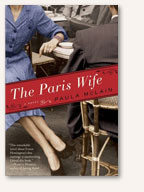by Paula McLain
 Let me preface by saying (with more than a hint of embarrassment) that I was an English major in college, yet have not read Ernest Hemingway. However, it served me well in the case of reading The Paris Wife. It was through the eyes of his first wife Hadley Richardson, in this historical nonfiction account, that I learned about Hemingway’s years in Paris as he established himself as a novelist.
Let me preface by saying (with more than a hint of embarrassment) that I was an English major in college, yet have not read Ernest Hemingway. However, it served me well in the case of reading The Paris Wife. It was through the eyes of his first wife Hadley Richardson, in this historical nonfiction account, that I learned about Hemingway’s years in Paris as he established himself as a novelist.
The story read beautifully and the characters were well developed. During their time in Paris, the Hemingways befriended ‘characters’ that could practically write themselves—from well-known literary figures like Gertrude Stein and F. Scott Fitzgerald to avant-garde socialites to liberated women with big careers at companies like Vogue. Some of these characters were in fact the inspiration for Hemingway’s The Sun Also Rises. Yet Hadley’s perspective is nonetheless insightful. Although she ran with Hemingway’s various crowds, she seemed to be on the outside looking in. While the rest of the group played partners in crime, she observed their behaviors and shed light on their vivid energy and silly flaws.
What I found myself continually intrigued by was the extravagance of their lifestyle—considering the fact that Hemingway was a “struggling artist” who barely got them by with his correspondent side gigs. They had a cook, and then a nanny after their son was born. They traveled extensively in Europe and for long periods of time. They had elaborate cocktail parties in Spain during the Running of the Bulls (apparently financed by a richer member of the group).
I know for many Hemingway’s reputation precedes him. In The Paris Wife, he is depicted as a bold man with a big ego. But with Hadley as the storyteller, you also witness tender moments between the two of them. Unfortunately in the end though, you see how his growing pains as a literary star did damage among his close friends, circles of friends, and most sadly, his devoted wife and their son. As he followed his latest fancies without the worry of leaving a detrimental trail behind, I did have to remind myself that it was the 1920s, and therefore not so easy to fault Hadley for being such a devoted wife no matter what he was up to.
With this book now behind me, the fact that I have not read Hemingway makes it a simple choice of what to read next. Up first are A Moveable Feast and The Sun Also Rises, two books that reflect this time in his life. I am curious to experience his prose, but even more so, his perspective.
—Christine, contributing author
I think one of the problems is that high schools usually assign The Old Man and the Sea since it is just a man and a big fish, so there’s nothing really anyone could be offended by, but it is really super boring. I read The Sun Also Rises in college, though, and really liked it. I’ve also heard great things about A Moveable Feast, so I’d be very interested in hearing what you think of either one.
I haaate Hemingway, but I loved The Paris Wife. I thought Hadley was a great character and I found young Ernest way more interesting than I expected to–I tend to think of his later years and get annoyed with him, but I liked the stories about this era a lot.
On a related note, have you seen the movie Midnight in Paris? It has some typical Woody Allen issues and the modern stuff is pretty annoying, but the parts in history are great and the guy playing Hemingway is ESPECIALLY great. Watching that movie, I think I *got* why people like him for the first time.
I’m still impressed you’re actually going to read his work, though. I’d rather read Faulkner.
I did see Midnight in Paris and loved the history parts. It was actually hard to read The Paris Wife and not visualize the Midnight in Paris actors for Hemingway and the Fitzgeralds, as they were all well cast. I will let you know what I think of the two Hemingway books I plan to read!